At Frankfurt School, students in the Master of International Business program get to know many facets of international business and economy. One of important aspects for us to learn is the work and impact of international organizations. The core course “International Business Environment” entails an exciting part – an excursion to Geneva, which is home to many international institutions. In the middle of May, the MIB class of 2018 had a great opportunity to spend four days in Geneva and visit six international organizations.
On an early Sunday morning, May 14, we left Frankfurt on a bus and then spent most of the day enjoying conversations with each other during this 8-hour ride. Having arrived to Geneva in the late afternoon, we went exploring the serene city, visiting most famous places such as Jardin Anglais (English Garden) and water fountain Jet d’Eau on the Lake Geneva.
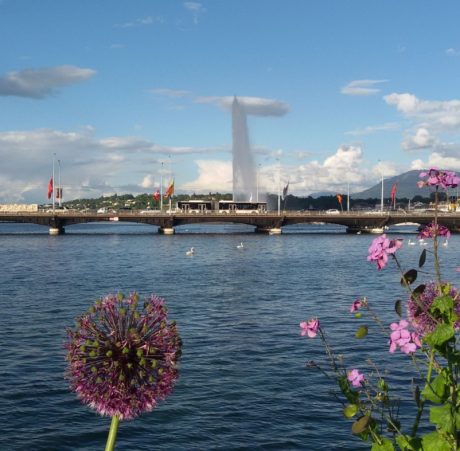
Lake Geneva and famous fountain Jet d’Eau
Next day, we woke up early for our visit to the World Economic Forum. Gill Cassar of the WEF held a presentation on the Fourth industrial revolution, one of the Forum’s key topics. The Forum, founded in 1971, is a platform where various groups – government officials, CEOs, academics, media and civil activists – discuss ideas that can improve the state of the world. WEF is proud of its independence and intellectual integrity, and concepts articulated by it are shaping agendas on regional, industry and global levels. Accentuating that “technological change is the only constant”, our speaker explained that WEF aims at helping leaders of today prepare for the future in the changing world by organizing Forum Meetings and doing extensive research. We made an overview of key technologies characterizing Fourth industrial revolution, such as 3D printing, Internet of Things, robotics, nanotechnological advances and others. Finally, we did an exercise by choosing several industries and identifying opportunities and risks that Fourth industrial revolution creates for them.
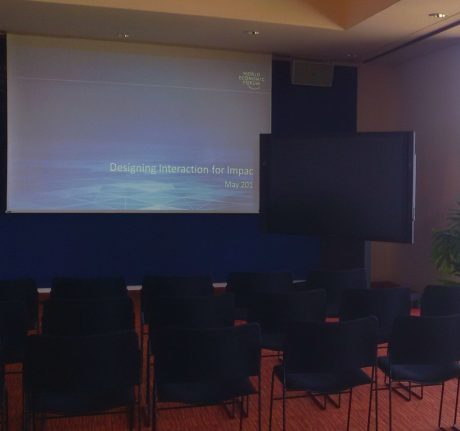
At the WEF
In the afternoon, there was a visit to the International Labor Organization. Founded in 1919, it develops international labor standards by its conventions, technical assistance to member countries, and training and advisory services to numerous social partners. The topic of the discussion at the ILO, led by Patricia Richter was the Organization’s program in social finance. ILO’s mandate in social finance, as we learnt, focuses on evaluating financial sector issues relevant for employment and social justice in order to diminish vulnerability of the working poor and create decent working conditions for everyone. We discussed several examples in the fields of impact investing, microfinance and impact insurance, and then were divided into small groups to work on individual tasks. Our group of five, for example, had a case study about ILO’s joint program with a Tajikistani microfinance institution aimed at narrowing the gender gap in entrepreneurship in the country, for which ILO provided trainings.
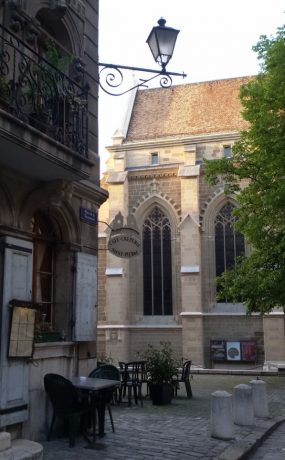
Old town of Geneva
On Tuesday we visited World Trade Organization. The key activities of the WTO include not only trade facilitation, but also trade policy reviews, dispute resolution and negotiations, technical assistance and training for developing countries – all to ensure transparency, predictability and stability of trade. Some important concerns for WTO are non-discrimination between local and foreign products and discouragement of practices such as dumping. The agreements implemented in the WTO system apply not only to industrial or agricultural goods, but also to services and intellectual property. At the Organization’s office, we had a talk about WTO’s main activities, procedures and current issues and perspectives. In particular, we discussed when protectionist measures such as increases in tariffs, duties and import quotas emerge, and the Organization’s attempts to facilitate trade to make it less costly for all involved parties, including of course, the end consumer. Moreover, we discussed the influence of plurilateral regional groups among WTO members on the perspectives for the whole Organization.
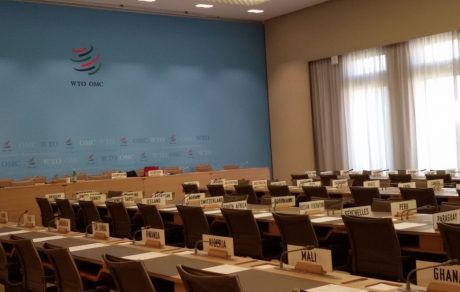
At the WTO
Next after WTO, we visited the office of the UN High Commissioner for Refugees, agency founded in 1950 and aiming at protecting refugees, asylum seekers, stateless and internally displaced persons. According to UNHCR estimations, today there are 65.3bn forcibly displaced persons worldwide. UNHCR, having staff of almost 11 thousand in 128 countries, has biggest operations in countries such as Afghanistan, Iraq, Somalia, South Sudan, Syria and others. There, one of the activities is providing people with most basic assistance such as shelters, clean water and medicine. In the talk with Mr. Lawrence Fioretta, we first discussed the differences between the concepts such as ‘refugee’, ‘asylum seeker’, ‘economic migrant’ and ‘internally displaced person’. Afterwards we discussed three durable solutions (apart from peace) that UNHCR tries to realize: voluntary repatriation, local integration in the host country, or resettlement to the third country.
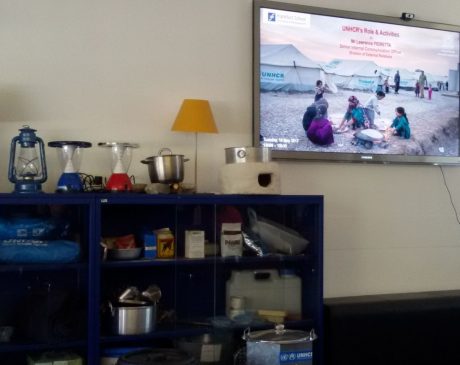
Basic assistance items at the UNHCR office
Our last day in Geneva was all about the UN. We visited the Palace of Nations and had two lectures about the work of United Nations Conference on Trade and Development (UNCTAD) and World Intellectual Property Organization (WIPO).
First there was a talk with Mark Willis of Debt Management and Financial Analysis System (DMFAS) of UNCTAD. The goal of DMFAS is to help developing countries manage their external and domestic debt in effective and sustainable way. Since the 1980s, it provides software, advisory services and trainings for IT staff and debt managers in central banks and finance ministries. The software (also called DMFAS) eases recording of debt information, calculation of interest and amortization, as well reporting and analysis of debt. Mr. Willis also talked about the challenges before DMFAS as well as its perspectives, given that many developing countries use not the UNCTAD system, but that of Commonwealth or even nationally-designed one. The overall mission of UNCTAD is “prosperity for all”. In pursuing it, it supports developing countries in accessing the benefits of globalized economy more effectively, which includes assistance in trade, investment and finance policies.
The last presentation was held by Cathy Jewell of the World Intellectual Property Organization. She gave us a comprehensive overview of WIPO’s activities, describing core treaties and registration systems within WIPO. We learned that the organization was founded in 1967 and has now 189 countries as members, and that first international conventions related to intellectual property were concluded already in 1880s. Mai
n activities of WIPO include creation of legal framework governing intellectual property elements (patents, trademarks, industrial design, origin-based products, copyright, domain names) and supporting policymakers, as well as improving access to intellectual property systems, especially in developing countries. WIPO also has a dispute resolution mechanism and serves as registration agency for some types of rights.
Finally, we had a guided tour of the Palace of Nations, which was originally built for the League of Nations in the 1930s but wasn’t used much by it because of the outbreak of the WWII. Large assembly halls impressed us a lot, especially one of them, where in 1945 Universal Declaration of Human Rights was written.
On this positive note our trip came to its end, and we boarded the bus, spending the evening in extensive discussions about the past four days.
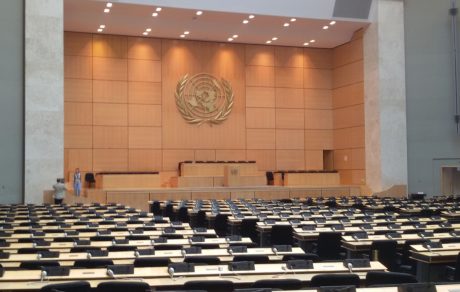
At the UN Palace of Nations
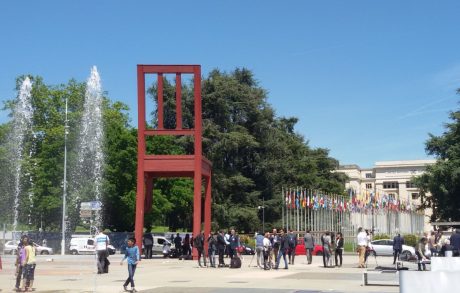
Busy workday in front of the Palace of Nations
The trip was very enriching – intellectually, culturally, personally. Not only did I learn new things or discover new viewpoints, I also enjoyed the company of my classmates, with whom we grew closer very much. The trip was a thought-provoking preparation for the class on international business environment, and the discussions on global issues were especially interesting because of educational and cultural diversity of our class. Finally, the trip to Switzerland was a great cultural experience, for the country has quite a unique historical path.